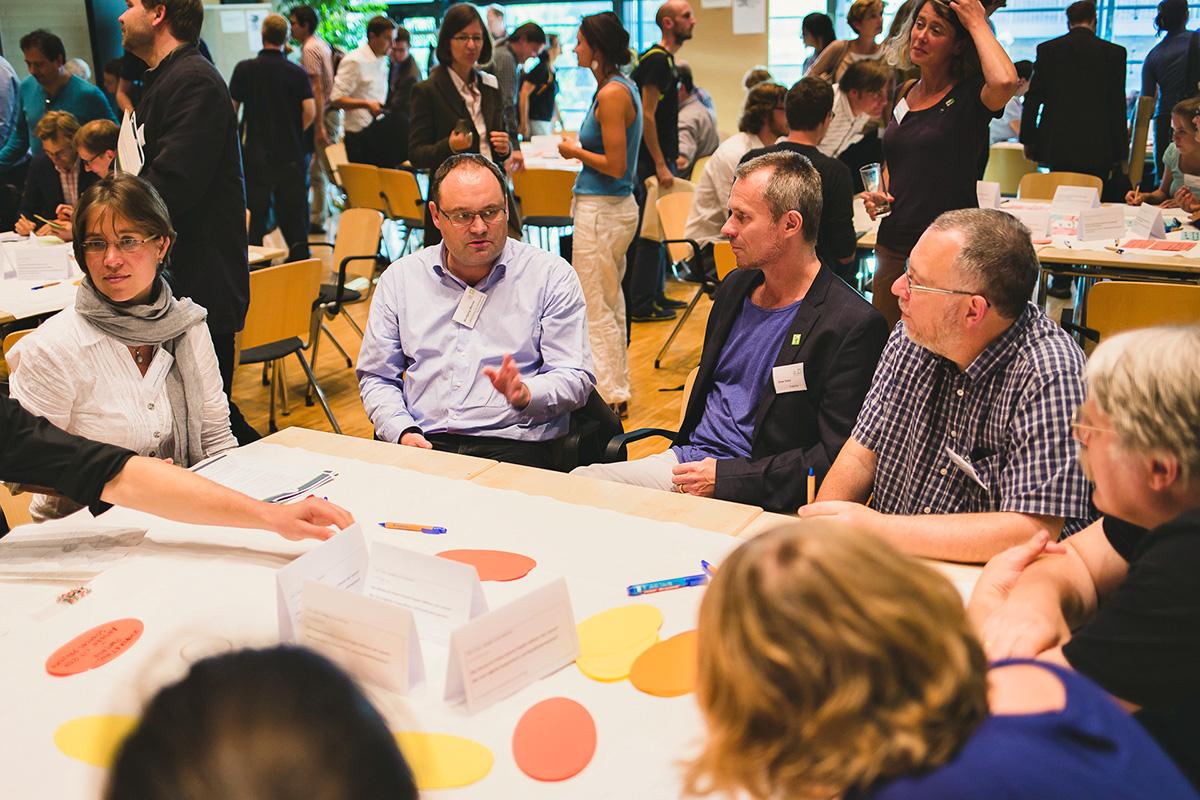In connection with the BürGEr schaffen WISSen (citizens create knowledge) (GEWISS) project, which is supported by the Ministry for Education and Research (BMBF), 700 participants from over 350 organisations developed a Green Paper entitled Citizen Science Strategie 2020 für Deutschland (Citizen Science Strategy for Germany 2020). It contains suggestions for strengthening existing activities as well as for the development of new structures and funding opportunities. The Green Paper for a Citizen Science Strategy 2020 in Germany will be presented in Berlin at the citizen science forum “Citizen Science – eine Strategie für Innovation und Nachhaltigkeit“ (Citizen Science – A Strategy for Innovation and Sustainability) on 16/03/2016.
Citizen Science has developed quite dynamically over the past few years. Citizen science means scientific research by volunteers, usually in cooperation with scientific institutions. “If citizen science is to be strengthened in Germany, the joint efforts of citizens and scientists and their achievements must be recognised,” says Dr. Katrin Vohland, Museum für Naturkunde Berlin, who is one of the project leaders. “Citizen science can lead to surprising and innovative insights in science, as well as generating social value added, such as social innovation, environmental education and potential for transformation,“ explains Prof. Dr. Aletta Bonn from the Helmholtz-Zentrum für Umweltforschung – UFZ (Helmholtz Centre for Environmental Research) and the Deutsches Zentrum für Integrative Biodiversitätsforschung (German Centre for Integrative Biodiversity Research) (iDiv) Halle-Jena-Leipzig. How can conditions in the German research environment be improved so that more people can participate in research? How can we ensure that the results achieved by the commitment of volunteers in recording biodiversity, measuring light pollution or research in local history will become part of the scientific discourse? How can the work of existing initiative, projects and associations be supported? What needs to be considered in terms of data quality or legal aspects? These and other questions were discussed with stakeholders from academia, society and politics during various meetings in connection with the BürgGEr schaffen WISSen (GEWISS) initiative. In an expansive series of dialogue forums involving 700 participants from 350 organisations, the Green Paper Citizen Science Strategy in Germany for 2020 was developed. This was underpinned by a nation-wide online consultation process and the submission of position papers. In addition, subject-specific reports, training material and a video clip were created as well as a wiki system with a toolkit for the implementation of citizen science, and the website http://www.buergerschaffenwissen.de was launched.
The Green Paper emphasizes the value added by citizen science in different social contexts. Scientists benefit from this type of cooperation, as it makes data collection more extensive and more efficient. New ideas and perspectives enrich scientific work and give academics a better handle on approaching social problems. Volunteers, too, benefit, as they gain an insight into new topics, meet people with similar interests, and can contribute to the bigger picture. This could be exploring one’s own environment or the universe, halting the progress of new diseases or improving the quality of life in cities. And, of course, research should be fun!
To further citizen science, participants need to be educated and trained to higher levels, liaison partners must be appointed in universities and institutes, and citizen science should become part of funding initiatives. Above all, however, citizen scientists in Germany must develop their networks, e.g. in connection with workshops, festivals or forums.
The Green Paper on Citizen Science Strategie 2020 für Deutschland (Citizen Science Strategy for Germany 2020) will be presented at the forum “Citizen Science - eine Strategie für Nachhaltigkeit und Innovation“ (Citizen Science – A Strategy for Innovation and Sustainability), on March 16th 2016 in Berlin, Berliner Stadtmission, Lehrter Str. 68. The event will provide participants fascinating insights into various projects as well as an overview of the main outcomes so far of the GEWISS initiative. Furthermore, there will be discussions[RF1] on how citizen science could become involved in other areas of social and sustainability research. Citizen science is here to stay – and this forum is another step forward.
Links
- Link - zum -> Forum Citizen Science
- Link -zur Strategie und trailer link + Archiv zur Entwicklung und Zitate http://www.konsultation.buergerschaffenwissen.de/
- Link - zu -> GEWISS Produkten
Contact:
Dr. Katrin Vohland
Museum für Naturkunde
Leibniz-Institut für Evolutions- und Biodiversitätsforschung
Forschungsbereichsleitung Wissenschaftskommunikation und Wissensforschung
Director Research Programme Public Engagement with Science
Invalidenstraße 43 |10115 Berlin| Tel: +49 -30 - 2093 8945
Email: katrin.vohland@mfn-berlin.de
http://www.naturkundemuseum-berlin.de/institution/mitarbeiter/vohland-katrin/
Prof. Dr. Aletta Bonn
Departmentleitung Ökosystemleistungen
Helmholtz-Zentrum für Umweltforschung – UFZ | Friedrich-Schiller-Universität Jena
Deutsches Zentrum fürIntegartive Biodiversitätsfroschung (iDiv) Halle-Jena-Leipzig
Deutscher Platz 5e | D-04103 Leipzig | Germany
phone +49 341 9733153 (office) | +49 171 8178735 (mob) | skype alettabonn
aletta.bonn@idiv.de | www.ufz.de/ess | www.ecology.uni-jena.de | www.idiv.de
Dr. Gesine Steiner / Pressesprecherin
Leiterin Stabsstelle Öffentlichkeitsarbeit
Museum für Naturkunde
Leibniz-Institut für Evolutions- und Biodiversitätsforschung
Invalidenstrasse 43
10115 Berlin
Tel. +49(0)30 2093 8917
Fax. + 49(0)30 2093 8914
e-mail:gesine.steiner@mfn-berlin.de
www.naturkundemuseum-berlin.de
Susanne Hufe
Pressestelle UFZ
E-mail: susanne.hufe@ufz.de
http://www.ufz.de/index.php?de=36336
